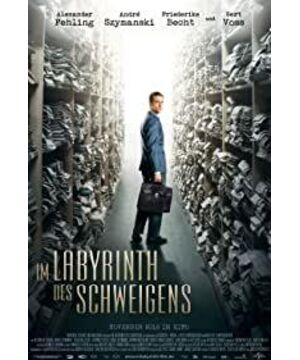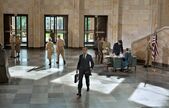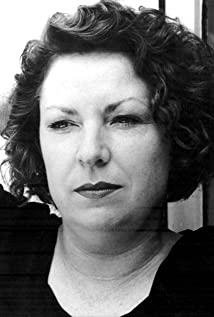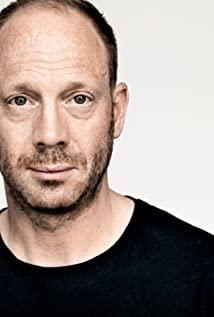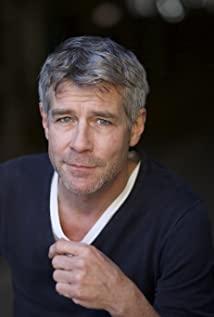[3 and a half stars, on the reflection on the topic of Auschwitz and group evil, this film is not as deep as the previous similar works, fortunately it is not intended to be here, but a reflection on reflection]
About Auschwitz Some of the most famous lines include the German-Jewish sociologist and philosopher Theodor Adorno in "Cultural Criticism and Society": "After Auschwitz, poetry is barbaric." . This sentence has always been interpreted in different ways, but I think it can be explained in this way. Auschwitz has ripped off the warm and rational coat of Western civilization, and showed the ugliest and barbaric side of individual humanity and social groups to the world. Writing beautiful and melancholy poems after these is nothing but deception.
In this film, it is not only poetry that deceives people, but also the Federal Republic of Germany in the early 1960s faced by the lonely young John Ludman. With the support of the post-war Allied powers and the leadership of Chancellor Adenauer Thanks to the concerted efforts of the people of the whole country, it took only a dozen years to build a new peaceful world on the ruins. There are jazz, Pepsi, bell skirts and other cultural symbols everywhere. On the other hand, those well-dressed social elites, splendid and respectable ladies and gentlemen, and the simple and industrious working people have jointly built a cage of lies, concealing the millions of massacres beneath the building that they spent 20 years building. The fact that the unjust soul in. Forced to be caught between this world of truth and falsehood, to expose lies, to pierce the cellophane that everyone is proud of, is to admit that contemporary culture is a kind of brainwashing of values that will deprive The identity of the entire country as a "free individual with the ability to think and judge independently" weakens everyone into a part of the cultural industry and the state apparatus. It can even go further: life itself is a lie, and everyone's every move, every development and change is nothing more than adding a decoration to the naked truth of death, piercing the lie, and to some extent means death. . Perhaps because of this, Ludman, who has seen the terrifying truth, will tell his innocent and happy girlfriend that we Germans should always only wear black, the color of mourning clothes.
A whole generation's reflections and criticisms of their parents and themselves are condensed into Radman alone. We watched him grow from a serious and ignorant young man to more and more indignant. While disgusting the whole world is extremely dark and shameless, he firmly believes that he is innocent. Because his jurist father, whom he loves and takes as an example, is innocent, but he forgets that all reflection will come down to reflecting on himself, so at the moment when the cruel truth is revealed at the end, he finds himself who has trusted lies for 20 years and every one of them. As filthy as a person, he took the lead in experiencing the pain of losing his independent civilized identity, and thus became a drunken angry youth. In him, we can see the shadow of Misha, who never loved the second woman so strongly in The Reader, and countless young people in the late 1960s who were addicted to alcohol, drugs and sex because of the ugly truth of their parents. What will the world do when the false cloak of the world is uncovered? Fear, confusion, self-defeating, early taste of death.
Or, face the truth and build a new fortress from the void where all is lost. Everything lost in Auschwitz must be slowly recovered from Auschwitz.
It was the last few days of December 2009. Like Radmann, I set off from Germany to Auschwitz. It was a very depressing trip. The tour guide in Auschwitz kept saying "You don't know how human beings are. Can do that kind of thing,” said that four directors were allowed to watch the content of the concentration camp archives that was not released to the public in order to make a movie, and several of them later committed suicide. Standing in front of the rows of wooden bedframes in the dark shack, walking past the wall-to-wall suitcases, rubber shoes, coats and hats and even human hair, I feel more than the passing of hundreds of thousands of lives. What is terrifying is that countless living lives here have lost their stories. Looking at the traces they left behind as the same parts are superimposed together and become a hill, I can't imagine that they were once costume designers, drama actors, pastry shop clerks, or university teachers, hotel owners, high school students, and more No matter what they did or thought on their way here by train, day and night living in these bungalows, or even the moment before they died. And it's not just the dead. The stories of the perpetrators hide behind the killing machine, as the 8,000 Waffen SS members reduce themselves to whipping arms, shooting hands and trampling boots. What is more sad than death is that he has clearly lived, but has lost his dignity and individuality as a human being. For the existence of the important relationship between guarding and imprisonment, he does not hesitate to weaken the living people at both ends of the chain into symbols and walking dead. When I stood outside the fence of Auschwitz and looked at the dry pastures and barracks in winter, I didn't read a cadic poem for anyone, but I thought that those who have been to Auschwitz and have seen the darkness of mankind should live better , instead of these silent nameless people, make their own voice.
This is what Radman understood from outside the fence of Auschwitz: after being lost, life will continue, making some heroic punishment criticism of old sins to satisfy his sense of superiority after occupying the moral high ground, It's not as important as presenting the stories and truths buried here to the world as they should be. After Auschwitz, the naive and simple pastoral songs may not continue, but those who have experienced the baptism of truth should pick up the pen to write vigorous prose, weave the net with words, and break the net with the philosophy and spirit behind the words.
Recognizing and acknowledging that one is part of a mass that is controlled by lies, yet constantly fighting for independent thought and individuality—that’s the raging flame of humanity that Ludman eventually ignited during his investigation of suspects and witnesses.
View more about Labyrinth of Lies reviews


